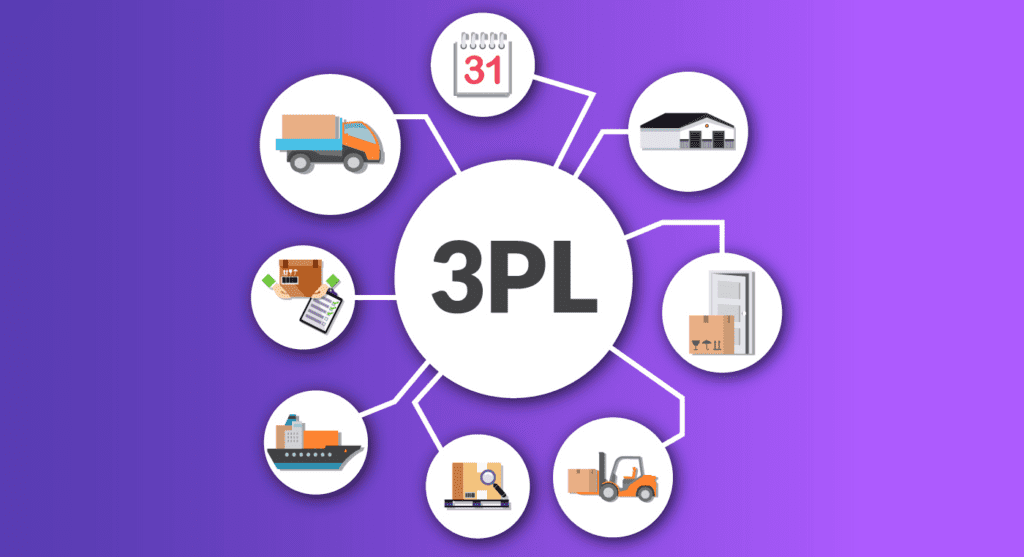
In the intricate world of logistics and supply chain management, understanding the distinctions between 1PL (First-Party Logistics), 3PL (Third-Party Logistics), and 4PL (Fourth-Party Logistics) is crucial for businesses seeking effective and streamlined operations.
This exploration into the differences between 1PL, 3PL, and 4PL serves as a compass for businesses navigating the complexities of modern logistics. It offers insights into how these logistics models can shape and optimize their approach to managing the flow of goods and information.
What is 3PL fulfillment?

3PL, or Third-Party Logistics, fulfillment refers to outsourcing the entire logistics and supply chain management process to a third-party service provider. In the context of e-commerce and retail, 3PL fulfillment is often associated with the storage, picking, packing, and shipping of products.
Benefits of 3PL Fulfillment
Third-Party Logistics (3PL) fulfillment services offer various benefits to businesses, particularly in the realm of e-commerce and supply chain management. Here are some advantages of utilizing 3PL fulfillment:
Cost Efficiency:
- Economies of Scale: 3PL providers often serve multiple clients, allowing them to benefit from economies of scale. This can result in lower costs for services such as warehousing, transportation, and packaging materials.
- Reduced Capital Expenditure: Outsourcing logistics functions to a 3PL eliminates the need for businesses to invest heavily in infrastructure. uch as warehouses and transportation fleets, reducing capital expenditure.
Focus on Core Competencies:
- Business Concentration: By entrusting logistics operations to a 3PL, businesses can concentrate on their core competencies, such as product development, marketing, and customer service, leading to improved overall efficiency.
- Strategic Planning: The time and resources saved through outsourcing logistics can be redirected toward strategic planning and business growth.
Scalability and Flexibility:
- Adaptability to Demand Fluctuations: 3PL providers offer scalable solutions that can easily accommodate fluctuations in order volumes and seasonal demand. Businesses can scale their logistics operations up or down based on their specific needs.
- Global Expansion: For businesses with international aspirations, 3PLs often have the infrastructure and expertise to facilitate global distribution. It makes it easier to expand into new markets.
Access to Advanced Technology:
- Integrated Systems: 3PL providers typically invest in advanced technologies for inventory management, order processing, and real-time tracking. Businesses can leverage these integrated systems without the need for significant upfront investments.
- Enhanced Visibility: Technology-driven solutions provided by 3PLs offer enhanced visibility into the supply chain, allowing businesses to monitor inventory levels, track shipments, and receive real-time updates.
Reduced Operational Risks:
- Expertise in Compliance: 3PL providers often have specialized knowledge of regulations and compliance requirements, especially in international logistics. This reduces the risk of errors and penalties associated with customs, tariffs, and other regulatory challenges.
- Insurance and Risk Management: Many 3PLs offer insurance coverage and risk management services, providing businesses with added protection against potential losses due to theft, damage, or unforeseen events during transit.
In summary, 3PL fulfillment services offer cost-effective, flexible, and scalable solutions, allowing businesses to optimize their supply chain operations and focus on their core business functions.

What is the Difference Between a 1PL, 3PL and 4PL?
The distinctions between 1PL (First-Party Logistics), 3PL (Third-Party Logistics), and 4PL (Fourth-Party Logistics) lie in their roles within the supply chain and the extent of services they provide. Here’s a breakdown of the key differences:
1PL (First-Party Logistics):
- Role: In a 1PL scenario, the company itself handles all aspects of its logistics and supply chain management without outsourcing to external parties.
- Responsibilities:
- Owning and operating its own transportation, warehousing, and distribution facilities.
- Managing inventory and order fulfillment internally.
- Example: A business that owns its own fleet of trucks, operates its warehouses, and directly handles all aspects of logistics.
3PL (Third-Party Logistics):
- Role: Involves outsourcing logistics and supply chain functions to an external third-party provider.
- Responsibilities:
- Providing various logistics services such as warehousing, transportation, order fulfillment, and distribution.
- Managing specific components of the supply chain on behalf of the client.
- Example: A company outsourcing its warehousing and order fulfillment to a third-party provider. It allows the business to focus on other core activities.
4PL (Fourth-Party Logistics):
- Role: 4PL providers act as integrators, overseeing and managing the entire supply chain on behalf of the client, including coordinating multiple 3PLs.
- Responsibilities:
- Acting as a single point of contact and accountability for the client.
- Coordinating and optimizing the services of various 3PLs to create a seamless supply chain.
- Offering strategic planning, technology solutions, and supply chain optimization.
- Example: A business hires a 4PL provider to manage its entire supply chain. It includes overseeing relationships with multiple 3PLs handling transportation, warehousing, and distribution.
In summary, the primary difference lies in the level of outsourcing and control. A 1PL manages its logistics entirely in-house, a 3PL outsources specific logistics functions, and a 4PL takes on a more comprehensive role by coordinating and managing the entire supply chain, often including multiple 3PLs. The shift from 1PL to 4PL typically involves increasing levels of outsourcing and a focus on strategic coordination and optimization.